Photo: George Jallo makes an opening presentation on the history of Johns Hopkins All Children’s Hospital. Photo source: All Children's Hospital
Cooperation among institutions is an important feature of science that allows research to grow. Collaboration increases the reach, development speed and impact of scientific discoveries. A collaborative process has become the norm for fields such as RNA biology, metabolism and oncology as they become more complex and competitive around the globe.
In the growing city of St. Petersburg, Florida, the RNA scientific community from the Johns Hopkins All Children’s Hospital (JHACH) and the Moffitt Cancer Center met on Friday, April 26, to share knowledge and work regarding RNA research and how findings can be applied to health care. The first RNA Biology and Therapeutics Trainee Retreat was organized by researchers from both institutions and took place at the Research and Education Building in JHACH. The meeting focused on sharing the tremendous work both institutions are performing to understand the nature of RNA, how it regulates metabolic processes and the ways this small molecule can be used for therapeutic purposes.
The retreat was a testament to the collaborative spirit that drives scientific progress. Graduate students, postdocs and professors from both institutions came together to share their diverse projects and hold insightful discussions about the future of RNA research at the centers.
The event started with an introduction from the JHACH vice dean and physician-in-chief, George Jallo, who talked about JHACH’s development as a research institution. He also discussed its growth from being a center focused on health care to the health care/research facility it is today. Attendants were engaged from the beginning — the introduction addressed the importance of applying basic science to patients’ lives.
After the first talk, trainees’ presentations started, with several postdocs and graduate students guiding the attendees through the RNA world. The presentations were divided into three sessions about RNA biology, metabolism and diseases, and RNA diagnostics and therapeutics. The sessions covered research being performed on models such as Drosophila and mice, and they spanned everything from circRNA to miRNA and lncRNA. Attendees also heard about transcription factors and RNA-binding proteins. Importantly, information about updated research on how to use RNA for therapy was included.

At midday, Elias Sayour (neurosurgery.ufl.edu/faculty-staff/research-faculty/elias-sayour/), who was invited from the University of Florida in Gainesville, gave the keynote presentation. An expert in RNA therapy and oncology, Sayour shared his ongoing work on RNA therapy using lipid vesicles as a transport mechanism, and how this new technology will improve cancer treatment by direct stimulation of the immune system. Faculty members and students had the opportunity to discuss their projects and get feedback from Sayour and other experts during the retreat presentations, which enriched their projects and enlightened their minds.
The event was designed with a clear aim: to foster interaction and collaboration among institutions. To facilitate this, the hosts and organizers provided breakfast and lunch, and a happy hour at the end of the event. This not only offered a platform for trainees to interact with new research groups — it also encouraged sharing of life experiences, career paths and scientific opinions among researchers of both centers.
The retreat was a success, and hosts and organizers from both institutes have agreed to make it an annual event in which all trainees can participate. Next year’s retreat will take place at the Moffitt Cancer Center. The event might be expanded to include the University of Florida and the University of South Florida. This would turn Tampa Bay and Central Florida into a core of RNA research collaboration where the Johns Hopkins University School of Medicine is an important player, thanks to the postdoc community in St. Petersburg.
Disclaimer: The author formed part of the organizing team for this event.
Related Content
- A Candid Conversation with the Nation’s Doctor: US Surgeon General Vivek Murthy at Johns Hopkins
- Global Threats to Public Health: Dr. Peter Hotez on Climate Change, Conflicts, Poverty and Antiscience
- School of Medicine Hosts LMSA – Northeast 50th Annual Regional Conference
Want to read more from the Johns Hopkins School of Medicine? Subscribe to the Biomedical Odyssey blog and receive new posts directly in your inbox.
